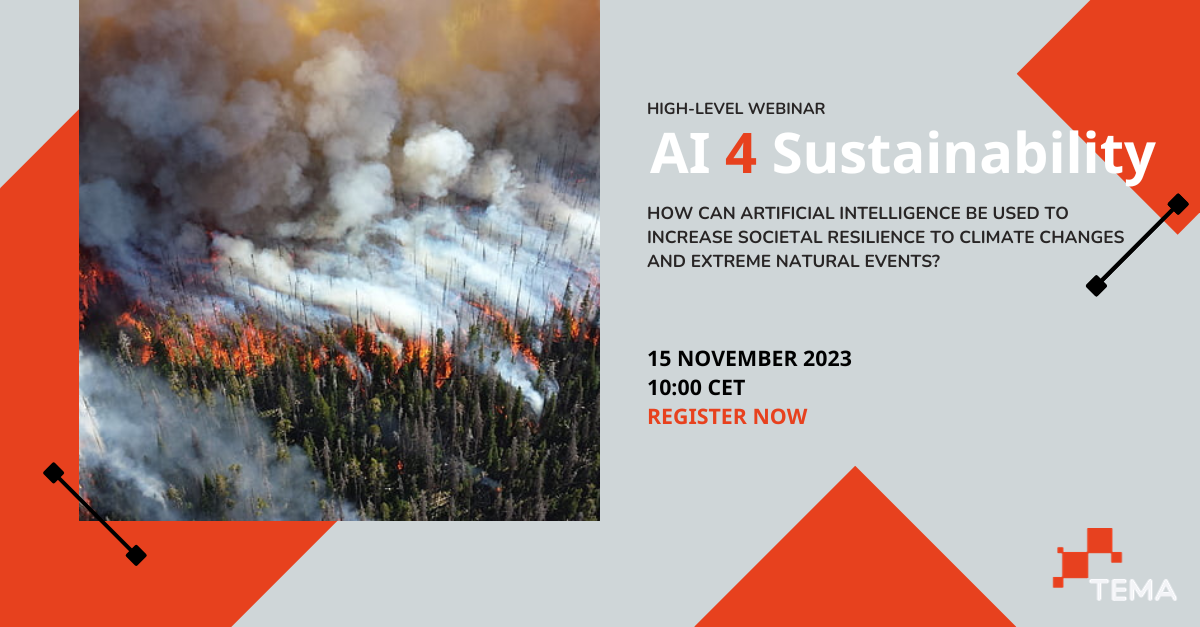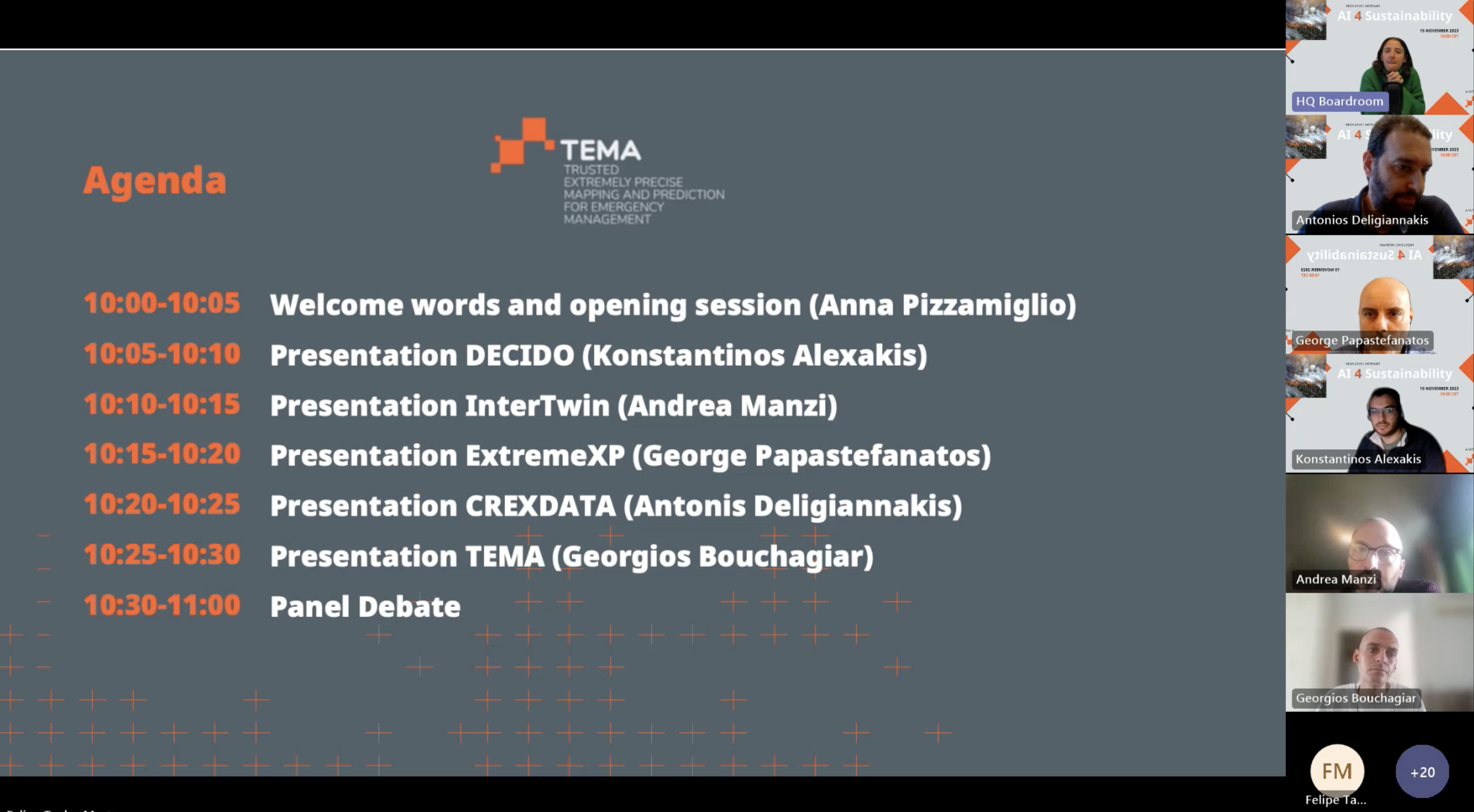TEMA AI4Sustainability Webinar

12 December 2023
Felipe Taylor Murta, Project Manager and Research Associate at The Lisbon Council.
Anna Pizzamiglio, Project Manager and Research Associate at The Lisbon Council.
TEMA project convened a high-level webinar entitled “AI 4 Sustainability” on November 15th 2023. The event was moderated by Anna Pizzamiglio from the Lisbon Council, and it counted with the participation of five sister projects representatives, including Konstantinos Alexakis from DECIDO; Andrea Manzi from InterTwin; George Papastenafatos from ExtremeXP; Antonis Deligiannakis from CREXDATA; and George Bouchagiar from TEMA.

Ms. Pizzamiglio kicked off the session introducing the importance of the use of AI for sustainability and outlining the presence of the technology in the fulfilment of international and European agendas, including the investment made through Horizon Europe projects. In that scope, the participating projects followed the queue, presenting their activities and objectives, and how AI was related.
Konstantinos Alexakis,R&D Software Engineer at DSS Lab, presented DECIDO project, which started in 2021. He explained the project focuses on four pilots (Turin, with floods, food waste, and Ukranian refugees scenarios; Greek, with power outages in an isolated island scenario; Finnish, with forest wildfires; and Spanish, with wildfires scenario), and based on the example of the Greek pilot, showed how DECIDO, using sensor data, create probabilities that are sent to a backend service that would decide to alert or not the Chalki.
Andrea Manzi, Data solutions manager at EGI Foundation, presented the interTwin project, which started in 2022. He described how climate change is leading to Extreme Weather Events (EWEs) and how the project is using data-driven models for analysing EWEs based on climate projections and proceeded to explain what the interTwin Digital Twin Engine they are developing will be capable of, focusing on two projection scenarios.
George Papastefanatos, Principle researcher at Athena Research Center, presented ExtremeXP project, which started in 2023. He presented the project´s vision of providing accurate, precise, fit-for-purpose, and trustworthy data driven insights by evaluating complex analytics variants and considering end users´ preferences and feedback. As well as the concept, the objectives, and the framework of the project, linking to their use cases that were relevant to the use of AI for sustainability, including the improvement of flash floods forecasting via AI and the use of AI methods for public protection and disaster relief for fire scenarios in urban areas, amongst others.
Antonios Deligiannakis, Professor at Technical University of Crete, presented CREXDATA project, which started in 2023. He displayed the project´s objectives and clarified that the project focuses on critical action planning.The project has three main use cases, one for weather emergency, one for health crisis, and one for maritime events under weather or emergency conditions, and that AI within CREXDATA is used for different purposes related to the use cases.
Lastly, Georgios Bouchagiar, Researcher at the Aristotle University of Thessaloniki, presented TEMA project, which started in 2022. He explained how TEMA will develop automated means for precise semantic mapping and phenomenon evolution prediction in real-time, in which AI plays an important role by utilizing drone images, satellite images, aircraft control, firefighter unit control, and social media data to support command centres in case of emergencies.
After the project´s presentations, Anna Pizzamiglio invited the speakers to a panel debate, composed of four main questions directed at them, whilst participants could also chip in with questions and insights.
The debate delved into key challenges and lessons learned. The speakers addressed issues like the handling of vast amounts of data, ensuring its quality, and the necessity of collaboration between research organisations and market/service providers for scalable and sustainable solutions.
One notable challenge highlighted was the unfamiliarity with AI among both authorities and citizens. The need for standardising data formats and models emerged as a crucial lesson, ensuring uniformity, integration, and accuracy in AI-driven analyses.
The panel also discussed the significance of collaboration between research organisations and market/service providers. While research organisations lead in developing innovative AI methodologies, market-related entities play a crucial role in scaling and sustaining these technologies.
A participant-raised question centred on integrating AI solutions into portfolios offered to cities and countries. The emphasis was on data sharing, interoperability, and establishing standards for AI data, models, and applications to create a cohesive portfolio for various stakeholders.
The final question explored the concept of "actionable insights" in AI applications, with a focus on explainable AI and data visualisation. The panelists highlighted the importance of providing insights that trigger policy decisions and aid in understanding complex AI methods, emphasising the role of visualisation in conveying information effectively.
The webinar concluded with thanks from Ms. Pizzamiglio, urging participants to stay engaged with the ongoing activities of the showcased projects. The event showcased not only the potential of AI in sustainability but also the collaborative efforts needed to turn innovative solutions into actionable strategies for a greener future.
Rewatch the webinar here for more insights.

